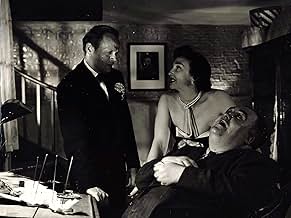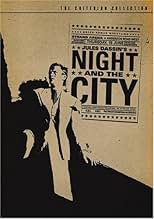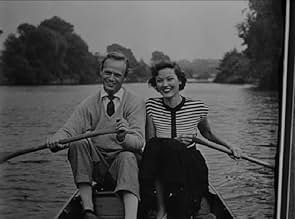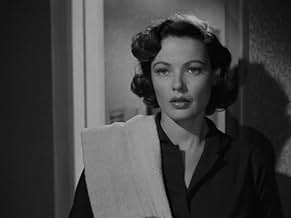IMDb रेटिंग
7.8/10
16 हज़ार
आपकी रेटिंग
अपनी भाषा में प्लॉट जोड़ेंA small-time grifter and nightclub tout takes advantage of some fortuitous circumstances and tries to become a big-time player as a wrestling promoter.A small-time grifter and nightclub tout takes advantage of some fortuitous circumstances and tries to become a big-time player as a wrestling promoter.A small-time grifter and nightclub tout takes advantage of some fortuitous circumstances and tries to become a big-time player as a wrestling promoter.
Ken Richmond
- Nikolas of Athens
- (as Ken. Richmond)
Paul Beradi
- Diner
- (बिना क्रेडिट के)
Derek Blomfield
- Young Policeman
- (बिना क्रेडिट के)
Clifford Buckton
- Policeman
- (बिना क्रेडिट के)
Ernest Butcher
- Bert
- (बिना क्रेडिट के)
Peter Butterworth
- Thug
- (बिना क्रेडिट के)
Naomi Chance
- Nightclub Hostess
- (बिना क्रेडिट के)
Edward Chapman
- Hoskins
- (बिना क्रेडिट के)
फ़ीचर्ड समीक्षाएं
Every where Richard Widmark's loser character Harry Fabian turns in this film he finds golden opportunities smothered in bad timing. Widmark utilizes a variation of that smarmy, snickering sinister giggle-chuckle that was memorialized in Kiss of Death.It serves the actor well in this film in its toned-down form but offers up a sort of pathetic body language for Fabian, the character. It may be that this American ex-patriot character is just way out of his depth. His hucksterism is not much appreciated by many of his acquaintances in this seedy London underworld. If Harry Fabian would simply accept that he is destined to be a 3rd rate shill and stooge,he might have fund some small pleasures. However, his mind is a shade too quick and his ambition too pumped. He's a user with not a shread of remorse about stepping on others, ripping them off, keeping one tiny step ahead of exposure. This is a superb film, squalid and sinister in its portrayal of greed, corruption and betrayal.
For some reason Night and the City doesn't seem to the credit it deserves; possibly because it was director Jules Dassin's last American film before being blacklisted as a Communist. I wasn't born until the Cold War was winding down, but it seems that with movies like Night and the City to his credit, we could have turned a blind eye even if he really was a Commie.
Honestly this film deserves to rank up there with the likes of The Maltese Falcon, Double Indemnity, or Out of the Past. The scenes of our "hero" Harry Fabian (Richard Widmark, at his best) being chased through London's East End are as starkly beautiful as anything you'll ever see on film. For several minutes there isn't a single shade of gray, everything is literally black or white and the camera itself seems to have joined in hunting Harry. Then there's the long, semi-grotesque wrestling scene that took me totally by surprise, it's like something out of Fellini.
Widmark is utterly believable as Fabian, a charming two-bit grifter who works as a "club tout" but hatches one ill-fated get-rich-quick scheme after another. The rest of the cast is excellent as well, there isn't a cardboard character in the bunch, except maybe Harry's girl Marry (Gene Tierney) though its really more a flaw in the character than the actress. Mary's saintliness may be the writers' only slip-up though, every other character has the sort of depth that makes the film a joy to watch. They inexorably follow their own motivations, which, of course, rely on those of someone else, who inevitably has a goal of his or her own, which will eventually derail the plan of someone whom someone else is counting on (actually, the film is a little less twisted than this review ;-) Criterion has just (2/05) recently released Night and the City and never has the phrase "filmed in glorious black and white" been more appropriate. Before this film seemed to lurk in the shadows of AMC or TCM, only occasionally showing its face, as if it were one of the genre's minor works. Now, if you haven't seen it you have no excuse, and you're only hurting yourself.
Honestly this film deserves to rank up there with the likes of The Maltese Falcon, Double Indemnity, or Out of the Past. The scenes of our "hero" Harry Fabian (Richard Widmark, at his best) being chased through London's East End are as starkly beautiful as anything you'll ever see on film. For several minutes there isn't a single shade of gray, everything is literally black or white and the camera itself seems to have joined in hunting Harry. Then there's the long, semi-grotesque wrestling scene that took me totally by surprise, it's like something out of Fellini.
Widmark is utterly believable as Fabian, a charming two-bit grifter who works as a "club tout" but hatches one ill-fated get-rich-quick scheme after another. The rest of the cast is excellent as well, there isn't a cardboard character in the bunch, except maybe Harry's girl Marry (Gene Tierney) though its really more a flaw in the character than the actress. Mary's saintliness may be the writers' only slip-up though, every other character has the sort of depth that makes the film a joy to watch. They inexorably follow their own motivations, which, of course, rely on those of someone else, who inevitably has a goal of his or her own, which will eventually derail the plan of someone whom someone else is counting on (actually, the film is a little less twisted than this review ;-) Criterion has just (2/05) recently released Night and the City and never has the phrase "filmed in glorious black and white" been more appropriate. Before this film seemed to lurk in the shadows of AMC or TCM, only occasionally showing its face, as if it were one of the genre's minor works. Now, if you haven't seen it you have no excuse, and you're only hurting yourself.
Recently out on Criterion DVD, with a restored print, this is a very nice example of 1950s film noir, although when it was made the director, Jules Dassin, didn't even know there was a classification known as film noir. In fact, the DVD extras, which include a fairly recent interview with the aging Dassin is as captivating as is the movie itself. Back in the late 1940s when "blacklisting" was a reality, Dassin was essentially told, go to London quickly, make this movie quickly, it may be your last. He made "Night and the City" without ever reading the source material, the book, and the movie is apparently quite different. Two versions were made simultaneously, using the same source film, but with different musical composers and different film editors. The DVD extras contains excerpts to demonstrate some of the differences, including a drastically different ending.
Good movie, worth a viewing for the acting of underrated Richard Widmark who plays Harry Fabian, an American post-war hustler in London. Fabian had big ideas of half-baked schemes and always was hitting up a friend for a hundred quid here, 300 quid there, to finance his latest get rich quick scheme. In the extras we learn that Gene Tierney was requested for the part of Fabian's girl Mary Bristol, because she was in a bad way after a recent romantic breakup, and according to Dassin "was suicidal." This movie helped bring her back to a good state.
Googie Withers, an actress I had never heard of, is good as Helen Nosseross, married to the rich but disgusting Phil (Francis Sullivan) and just wanting to get a license for her own night spot and a chance to break away from her husband. She is forced to deal with Fabian, a decision that cost her dearly.
Perhaps the most interesting actor is Stanislaus Zbyszko, one time "world's strongest man" from Poland, in 1949 living in New Jersey. Even though he was unexperienced, he gives a super performance as an old retired wrestler Gregorius the Great, who was grooming his son for a wrestling career. Mike Mazurki plays his nemesis, The Strangler.
Although the story gets a bit complex in the various relationships, it simply distills into Fabian seeing an opportunity to contract Gregorius to feature a wrestling match that will allow Fabian, at least in his eyes, to "control" wrestling in London. But his various scams catch up with him and all does not turn out well, as is the case in a film noir.
Good movie, worth a viewing for the acting of underrated Richard Widmark who plays Harry Fabian, an American post-war hustler in London. Fabian had big ideas of half-baked schemes and always was hitting up a friend for a hundred quid here, 300 quid there, to finance his latest get rich quick scheme. In the extras we learn that Gene Tierney was requested for the part of Fabian's girl Mary Bristol, because she was in a bad way after a recent romantic breakup, and according to Dassin "was suicidal." This movie helped bring her back to a good state.
Googie Withers, an actress I had never heard of, is good as Helen Nosseross, married to the rich but disgusting Phil (Francis Sullivan) and just wanting to get a license for her own night spot and a chance to break away from her husband. She is forced to deal with Fabian, a decision that cost her dearly.
Perhaps the most interesting actor is Stanislaus Zbyszko, one time "world's strongest man" from Poland, in 1949 living in New Jersey. Even though he was unexperienced, he gives a super performance as an old retired wrestler Gregorius the Great, who was grooming his son for a wrestling career. Mike Mazurki plays his nemesis, The Strangler.
Although the story gets a bit complex in the various relationships, it simply distills into Fabian seeing an opportunity to contract Gregorius to feature a wrestling match that will allow Fabian, at least in his eyes, to "control" wrestling in London. But his various scams catch up with him and all does not turn out well, as is the case in a film noir.
This gritty film, exposing the world of small time crooks in London, is a real masterpiece of film noir. The director, Jules Dassin, has captured this dark, dirty world perfectly and the black and white cinematography is superb. Richard Widmark is as despicable here as he was as Tommy Udo in "Kiss of Death"...it is a coup of casting. Francis Sullivan as Phil is great as the nightclub owner for whom Widmark shills and Googie Withers, one of my favorites of British film, is awesome as the unfaithful wife. Gene Tierney is wasted as Widmark's girlfriend...she does not seem to have much to do. Other support players are strong and you get to see Herbert Lom without his toupee! This is one of the best in the film noir genre and the ending pulls no punches. This is not a happy, feel good film. Highly recommended.
In London, the swindler Harry Fabian (Richard Widmark) is an ambitious loser, frequently taking money from his girlfriend Mary Bristol (Gene Tierney). When he meets the famous Greco-Roman wrestler Gregorius the Great (Stanislaus Zbyszko) in the arena of his son and the wrestling lord Kristo (Herbert Lorn), he plans a scheme to become successful. He cheats Greorious, promising clean combats in his own arena, and the old man accepts the partnership. However, without money to promote the fight, he invites his boss and owner of a nightclub Phil Nosseross (Francis L. Sullivan) to be his partner, but is betrayed and his business fails ending in a tragedy.
"Night and the City" is a great film-noir, with many twists and another excellent performance of Richard Widmark. The story shows the underworld of London, with low-lives, hustlers, beggars, gamblers and other amoral characters through a magnificent black and white cinematography. The direction of Jules Dassin is sharp and the screenplay perfectly develops the characters and the story in an excellent pace. The Brazilian distributor Oregon Filmes / Fox has one of the best collections of movies labeled "Tesouros da Sétima Arte" ("Treasures of the Seventh Art"). Unfortunately, most of their DVDs shamefully have problems while playing the film, maybe because of the lack of quality of the laboratory they use. My vote is nine.
Title (Brazil): "Sombras do Mal" ("Shadows of Evil")
Note: On 10 October 2016, I saw this film again.
"Night and the City" is a great film-noir, with many twists and another excellent performance of Richard Widmark. The story shows the underworld of London, with low-lives, hustlers, beggars, gamblers and other amoral characters through a magnificent black and white cinematography. The direction of Jules Dassin is sharp and the screenplay perfectly develops the characters and the story in an excellent pace. The Brazilian distributor Oregon Filmes / Fox has one of the best collections of movies labeled "Tesouros da Sétima Arte" ("Treasures of the Seventh Art"). Unfortunately, most of their DVDs shamefully have problems while playing the film, maybe because of the lack of quality of the laboratory they use. My vote is nine.
Title (Brazil): "Sombras do Mal" ("Shadows of Evil")
Note: On 10 October 2016, I saw this film again.
क्या आपको पता है
- ट्रिवियाDirector Jules Dassin made the film while in the process of being blacklisted. Fox studio chief Darryl F. Zanuck told him it could possibly be the last film he'd ever direct, so he should shoot the most expensive scenes first so the studio wouldn't be able to blacklist him until it was completed.
- गूफ़As Harry is being chased through the streets of London at night, he runs down a set of stairs, then turns and runs down a lit street. In the foreground, the cameraman and director's shadows are clearly outlined against the street.
- भाव
Opening voice-over: Night and the city. The night is tonight, tomorrow night... or any night. The city is London.
- इसके अलावा अन्य वर्जनThere are two versions of this film: the British release and the International/American release. Some examples are: a differing voice-over speech; some changed dialogue; the opening scene where Harry returns home after 3 days away is a different take and the nightclub scenes are longer in the British version. The scores of the two films are also entirely different and alternate shots are used at the ending in the British version.
- कनेक्शनEdited into American Cinema: Film Noir (1995)
- साउंडट्रैकHere's to Champagne
(uncredited)
Written by Noel Gay
Performed by Gene Tierney (voice dubbed by Maudie Edwards)
टॉप पसंद
रेटिंग देने के लिए साइन-इन करें और वैयक्तिकृत सुझावों के लिए वॉचलिस्ट करें
- How long is Night and the City?Alexa द्वारा संचालित
विवरण
- रिलीज़ की तारीख़
- कंट्री ऑफ़ ओरिजिन
- भाषा
- इस रूप में भी जाना जाता है
- Noć i grad
- फ़िल्माने की जगहें
- Hammersmith Bridge, हैमरस्मिथ, लंदन, इंग्लैंड, यूनाइटेड किंगडम(Harry runs across this bridge after leaving Figler's hideout, running to Anna O'Leary's boat shop)
- उत्पादन कंपनियां
- IMDbPro पर और कंपनी क्रेडिट देखें
बॉक्स ऑफ़िस
- दुनिया भर में सकल
- $43,024
- चलने की अवधि
- 1 घं 41 मि(101 min)
- रंग
- पक्ष अनुपात
- 1.37 : 1
इस पेज में योगदान दें
किसी बदलाव का सुझाव दें या अनुपलब्ध कॉन्टेंट जोड़ें




































